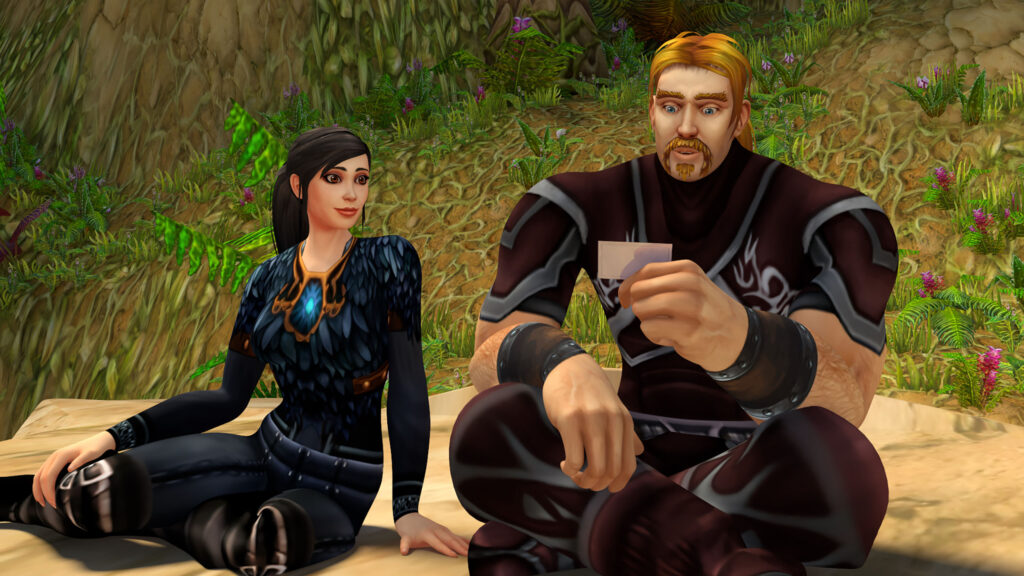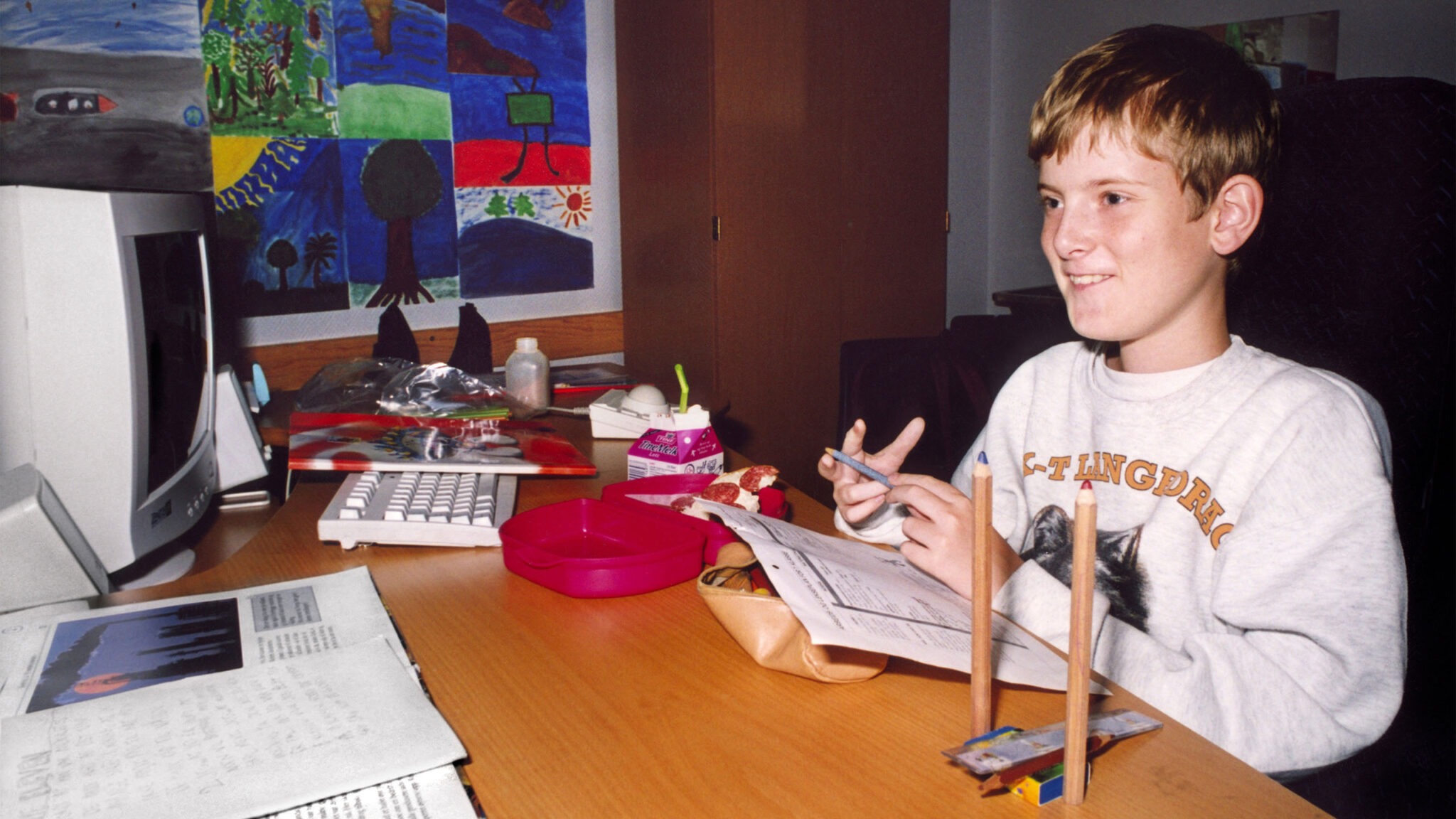By Jessica Herndon
One of the most exciting things about the Sundance Film Festival is having a front-row seat for the bright future of independent filmmaking. While we can learn a lot about the filmmakers from the 2024 Sundance Film Festival through the art that these storytellers share with us, there’s always more we can learn about them as people. This year, we decided to get to the bottom of those artistic wells with our ongoing series: Give Me the Backstory!
Whether you love virtual worlds or are skeptical of them, there is no doubt about it: “We are moving more and more into the metaverse,” says filmmaker Benjamin Ree, whose documentary The Remarkable Life of Ibelin tells the stirring and heartfelt story of Norwegian gamer Mats Steen. Until his passing in 2014, Steen used a wheelchair due to Duchenne muscular dystrophy but lived an adventurous life online as Ibelin, his brawny avatar in the multiplayer video game World of Warcraft.
Premiering at the 2024 Sundance Film Festival, the doc won the Audience Award: World Cinema Documentary, and Ree won the Directing Award: World Cinema Documentary. The moment marked a significant milestone for the filmmaker, coming four years after his 2020 Fest premiere of The Painter and the Thief, a film that won the World Cinema Documentary Special Jury Prize for Creative Storytelling and established him as a director with a deep understanding of empathy and how people connect.
The idea for The Remarkable Life of Ibelin was born after Ree read a BBC article about Steen. Moved by Steen’s journey of belonging in the digital world, Ree reached out to Steen’s parents, asking for their permission to make a doc about his life. With their support, Ree explored his moving story through interviews, Steen’s writing, and animated visuals. By showing us how the digital world can foster connections as meaningful as our lives outside of it, the film challenges viewers to reconsider the boundaries between life on- and offline.
Inspiring connection and eliminating the negative stigma around gaming were Ree’s goals when making the film. The project’s biggest inspiration was “Mats ‘Ibelin’ Steen himself,” he says. “What a warm, intelligent, sometimes self-destructive, funny, secretive person he was. He has inspired me in many ways, like the importance of asking your friends how they are really doing — and then having the time to listen.”
Below, Ree discusses how his doc helped Steen’s family through their grieving process, what it was like connecting with some of Steen’s gamer friends, and the moment that transformed his career.

Films are lasting artistic legacies; what do you want yours to say?
The value of a life. The generational gap. The impact of online communities. Seek first to understand, then to be understood. Not the other way around.
Who do you want The Remarkable Life of Ibelin to reach?
Of course gamers. But also non-gamers, and especially parents who have cut the Wi-Fi connection to their children because they were gaming too much. A vast majority of news coverage about gaming has been negative. This film tries to invite non-gamers into an actual avatar life so they can experience eight years of an actual lived avatar life.
Tell us an anecdote about casting or working with your actors.
Around 42,000 pages of actual recorded gaming dialogue had been transcribed and archived from Mats and his friends. This is very rare. Mats and his friends used programs to transcribe role-play dialogue and descriptions, and they stored it. This is something a guild or community has to do by themself; it is not a feature in the game itself.
To make this film, we have used this massive archive to reconstruct Ibelin’s life. All dialogue is the actual writings of Mats and his friends. I have used my own avatar to meet Mats’ friends inside World of Warcraft to get a context of where scenes took place and what happened. Also, since they are role-players, they wrote out a lot of their emotions. The transcripts actually look like movie scripts, with sentences like: “Ibelin picks up a small flat rock and throws it into the ocean, he watches as it skips on the water surface.” or “Ibelin seems sincere, yet saddened.” This is how they communicate specific and nuanced descriptions of actions and emotions, and I wanted to animate this as well. So, instead of showing the game as it is, we would recreate the feeling of being in the game, role-playing — all based on real events. By doing that, I hope that everyone will be invited into this world.
The actors were given a lot of role-play descriptions and dialogue, and the choices they made were incredible. Visible Agency cast most of the actors and found amazing performers.
So, when I showed the animated scenes with voice actors reading, the real people behind the avatars approved and felt the voices and choices represented their characters.
What was your favorite part of making the film? Memories from the process?
When I showed the film to Mats’ family. They wanted to watch every version of the film, and they ended up watching the film around 100 times.
Watching became a part of their healing and grieving process after their son passed away, and they felt for the first time invited into a world they didn’t understand.
Ibelin is an independent Norwegian production, but in order to re-create what kind of life Mats lived in World of Warcraft, we needed approval from the company that owns the right to the game. We were inspired by the way Life, Animated had made their film. They showed Disney the documentary when they were almost finished editing the film to get approval to use their animations.
We did the same. We made the film without their knowledge. Then, when we had an almost finished version, we traveled to California to show them the film. I was so nervous that I almost couldn’t breathe. We had then spent three years making the film. I had to take some extra shots of Ventolin to stabilize my asthma. So, right after the film, when the end credits were rolling, I looked at all the bosses in the screening room and they were clearly moved. They turned around and immediately granted us the right to use their world as it was in the film. They have been big supporters of the film since then.

What is something that all filmmakers should keep in mind in order to become better cinematic storytellers?
Hope and contrasts. Stories need hope. Stories need contrasts. [This is] surprisingly often overlooked.
Tell us about your history with Sundance Institute. When was the first time you engaged with us? Why did you want your film to premiere with us?
Back in 2019, I was thinking of ending my film career and going back to journalism. I had just finished the film The Painter and the Thief and I thought the film was incredibly bad. We had submitted the film to festivals throughout the year and were declined by everyone nationally and internationally. Our co-producer had left the project because they didn’t like the film. So, I sat down and re-edited the film chronologically in a mental breakdown. People who have seen the film would know that its hallmark is the nonchronological structure.
My producer had sent the film to Sundance, and they had watched the original nonchronological version, not my mental breakdown version, and they loved it. In November 2019, Harry Vaughn from Sundance called me up to say it was selected as one of the opening films that year. It changed my career completely. The film was sold to Neon and got distribution all over the world. It won more than 30 awards, several of them at some of the world’s biggest film festivals [in] London, Hong Kong — and also the Sundance Film Festival. The film was named 2020’s best [documentary] by the BBC, [was critically acclaimed by] The Boston Globe, The Washington Post, and The New York Times, and it has been named an important film in film history by several media outlets. [In 2020, it was on] the International Documentary Association’s list of the best documentaries of the decade. [In 2021 it was on] Vulture’s 101 Greatest Endings in Movie History list. [And] in 2022 it was on MUBI’s best movies in film history list ranked in the top 100.
It shows the power of curating movies and giving movies a great start.
Without Sundance, I wouldn’t have made Ibelin.
And I am so grateful that they have selected [Ibelin].







